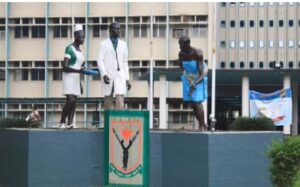Rising Childhood Cancer Cases in Nigeria: LUTH Reports Over 300 Incidents in 2013
Rising Childhood Cancer Cases in Nigeria: LUTH Reports Over 300 Incidents in 2013

Dr. Abidemi Omonisi, an oncologist and consultant pathologist, revealed that the Lagos University Teaching Hospital (LUTH) recorded over 300 cases of childhood cancer in 2013. Speaking at the Nigeria imPACT Review town hall meeting in Abuja, he expressed alarm over the increasing prevalence of pediatric cancers and called for greater government intervention.
Dr. Omonisi, who also serves as the vice president of the Nigeria Cancer Society and previously directed the National System of Cancer Registries at the National Institute for Cancer Research and Treatment (NICRAT), noted that current governmental efforts predominantly focus on adult cancers, such as breast, cervical, and prostate cancer. He emphasized the importance of recognizing that children can also develop cancer.
Historically, Burkitt lymphoma was the most frequently diagnosed pediatric cancer in Nigeria, according to the Ibadan Cancer Registry. However, Dr. Omonisi indicated a notable shift, with rising cases of leukemia now dominating LUTH’s children’s oncology department. He stated, “The landscape is changing; we are now observing more hematological cancers, particularly leukemia.”
Reflecting on his work at LUTH, where he helped establish Nigeria’s first child cancer registry, Dr. Omonisi highlighted that the data collected indicates a significant increase in cases, with over 300 reported annually in just one department. He urged that similar registries be developed across Nigeria’s six geopolitical zones within the next few years to facilitate better tracking and analysis of childhood cancers.
He pointed to various potential triggers for cancer, including genetic factors and environmental exposures such as infections, diet, and radiation. Dr. Omonisi also stressed the importance of antenatal care and genetic testing for families with a history of cancer, advocating for preventive measures to be taken early.
While acknowledging improvements in Nigeria’s cancer control framework, including the establishment of agencies like NICRAT, he noted that gaps remain in data collection and resource distribution. Collaborations with international organizations such as the International Atomic Energy Agency (IAEA) and the World Health Organization (WHO) are underway to address these issues through capacity building and technical assistance.
Dr. Omonisi urged parents to remain vigilant and to dispel the misconception that childhood cancer is rare, stressing that early diagnosis and timely treatment are vital for improving outcomes.
Ilaura Haskins, team lead for the IAEA, explained that the impact review was initiated at the request of the minister of state for health, Dr. Tunji Alausa. The goal is to conduct a comprehensive analysis of Nigeria’s current cancer control capabilities and identify areas for improvement. A final report with situational analysis and tailored recommendations will be submitted to the ministry following the assessment.
TRENDING SONGS
 Trending Video: Muslim Man Joins Wife in Hallelujah Challenge ‘Dress Like Your Miracle’ Night
Trending Video: Muslim Man Joins Wife in Hallelujah Challenge ‘Dress Like Your Miracle’ Night
 Woman Seeks Advice as Late Brother’s Wife Refuses to Mourn Him Following His Death With Alleged Mistress
Woman Seeks Advice as Late Brother’s Wife Refuses to Mourn Him Following His Death With Alleged Mistress
 Nobody Cares About Fine Girls In The UK, I Miss Nigeria — Nigerian Lady Laments
Nobody Cares About Fine Girls In The UK, I Miss Nigeria — Nigerian Lady Laments
 Wedding Called Off: How Lady Cancels Wedding After Finding Out Finance’s Affairs With Her Bestie
Wedding Called Off: How Lady Cancels Wedding After Finding Out Finance’s Affairs With Her Bestie
 Heartbreak in Ikeja: Lady Weeps After Fufu Found in New Phone Package
Heartbreak in Ikeja: Lady Weeps After Fufu Found in New Phone Package
 Twist of Fate: Man Who Questioned Phyna’s ₦1Billion Demand Mourns Brother in Dangote Truck Crash
Twist of Fate: Man Who Questioned Phyna’s ₦1Billion Demand Mourns Brother in Dangote Truck Crash
 Tragedy in Enugu: Dangote Truck Claims Lives of Family of Five
Tragedy in Enugu: Dangote Truck Claims Lives of Family of Five
 Bangkok Crackdown: Nigerian-Thai Couple in Police Net Over Drug Trafficking
Bangkok Crackdown: Nigerian-Thai Couple in Police Net Over Drug Trafficking
 Family Rift: Reno Omokri’s Ex-Wife Says He Deserted Their Special Needs Son
Family Rift: Reno Omokri’s Ex-Wife Says He Deserted Their Special Needs Son
 The Man Who Sent Money for Two Decades, Only to Return to an Empty Shell
The Man Who Sent Money for Two Decades, Only to Return to an Empty Shell
Share this post with your friends on ![]()













